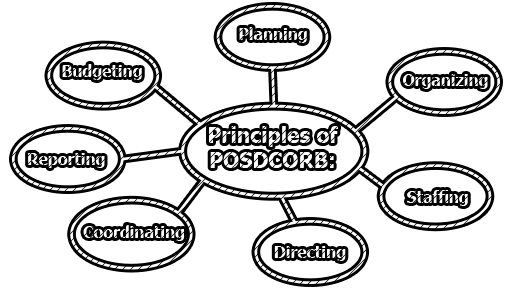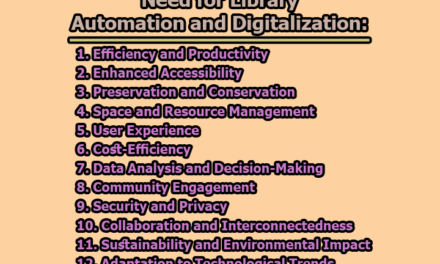Principles of POSDCORB:
The principles of POSDCORB are a management theory first proposed by Luther Gulick, an American public administrator, in 1937. This theory outlines the core functions of management and serves as a guide for effective administrative practice. POSDCORB is an acronym that stands for Planning, Organizing, Staffing, Directing, Coordinating, Reporting, and Budgeting. Here are the principles of library POSDCORB:
- Planning: The planning principle of POSDCORB involves setting objectives and goals and determining the means to achieve them. Planning is the first step in any management process as it provides a framework for decision-making and helps managers allocate resources efficiently. The planning process involves identifying the organization’s mission, analyzing the internal and external environment, defining goals and objectives, and developing strategies to achieve them. Effective planning requires managers to consider the resources available, potential risks and opportunities, and the impact of their decisions on stakeholders.
- Organizing: The organizing principle of POSDCORB involves arranging resources and activities in a structured and systematic way to achieve the organization’s goals. Organizing involves determining the most efficient and effective way to allocate resources, define roles and responsibilities, and establish communication channels. Managers must ensure that the organization’s structure is aligned with its goals, and that employees are working together effectively. Organizing also involves developing policies and procedures to guide employees’ actions, establishing performance metrics to evaluate progress, and maintaining proper documentation.
- Staffing: The staffing principle of POSDCORB involves acquiring, developing, and retaining a capable and motivated workforce. Staffing is essential in ensuring that the organization has the human resources necessary to achieve its goals. The staffing process involves identifying the skills and competencies required for each position, recruiting and selecting candidates, providing training and development opportunities, and evaluating employee performance. Effective staffing practices require managers to maintain open communication with employees, recognize their contributions, and provide opportunities for growth and development.
- Directing: The directing principle of POSDCORB involves guiding and motivating employees to achieve the organization’s goals. Directing involves communicating expectations, setting goals, providing feedback, and resolving conflicts. Effective directing practices require managers to understand the strengths and weaknesses of their employees and to provide them with the necessary resources and support to achieve their objectives. Directing also involves promoting a positive organizational culture, providing opportunities for employee involvement and engagement, and recognizing employee contributions.
- Coordinating: The coordinating principle of POSDCORB involves integrating the activities of different departments and individuals to achieve common goals. Coordination involves establishing communication channels, resolving conflicts, and promoting teamwork. Effective coordination requires managers to understand the interdependencies among different functions and to promote collaboration and cooperation. Coordination also involves establishing clear lines of authority and responsibility, defining decision-making processes, and monitoring performance to ensure that goals are being achieved.
- Reporting: The reporting principle of POSDCORB involves providing information to stakeholders about the organization’s performance. Reporting involves developing performance metrics, collecting data, analyzing results, and communicating information to stakeholders. Effective reporting practices require managers to use objective and reliable data, to provide accurate and timely information, and ensure that stakeholders understand the implications of the data. Reporting also involves identifying areas for improvement, developing action plans to address deficiencies, and monitoring progress.
- Budgeting: The budgeting principle of POSDCORB involves allocating financial resources to achieve the organization’s goals. Budgeting involves developing a financial plan, monitoring expenses, and controlling costs. Effective budgeting requires managers to prioritize spending based on the organization’s strategic objectives, identify potential sources of revenue, and monitor financial performance to ensure that goals are being met. Budgeting also involves establishing financial controls, ensuring compliance with regulations and policies, and conducting regular audits to ensure financial transparency and accountability.
Finally, we can say that the principles of library POSDCORB can help to ensure that library operations and services are effectively planned, organized, and coordinated and that resources are allocated efficiently. By adopting the above principles, library managers can help to ensure that libraries remain valuable resources for their communities.
References:
- Gulick, L. H. (1937). Notes on the theory of organization. In L. Gulick & L. Urwick (Eds.), Papers on the science of administration (pp. 3-44). New York, NY: Institute of Public Administration.
- Gulick, L. H., & Urwick, L. (Eds.). (1937). Papers on the science of administration. New York, NY: Institute of Public Administration.
- Baker, M. J., & Mangan, J. (2010). Models of organizational management. In M. J. Baker & J. Mangan (Eds.), Handbook of business and management (pp. 1-18). London, UK: SAGE Publications.
- Bryson, J. M. (2018). Strategic planning for public and nonprofit organizations: A guide to strengthening and sustaining organizational achievement (5th ed.). San Francisco, CA: Jossey-Bass.
- Denhardt, J. V., & Denhardt, R. B. (2015). The new public service: Serving, not Steering (4th ed.). New York, NY: Routledge.
- Hummel, R. P. (1991). Revisiting POSDCORB: The case for a new administrative theory. Public Administration Review, 51(6), 505-518.
- Kettl, D. F. (2010). The politics of the administrative process (6th ed.). Washington, DC: CQ Press.
- Svara, J. H. (2015). The basics of public administration (1st ed.). Thousand Oaks, CA: SAGE Publications.
- Thompson, J. D. (2003). Organizations in action: Social science bases of administrative theory (2nd ed.). New Brunswick, NJ: Transaction Publishers.

Library Lecturer at Nurul Amin Degree College










